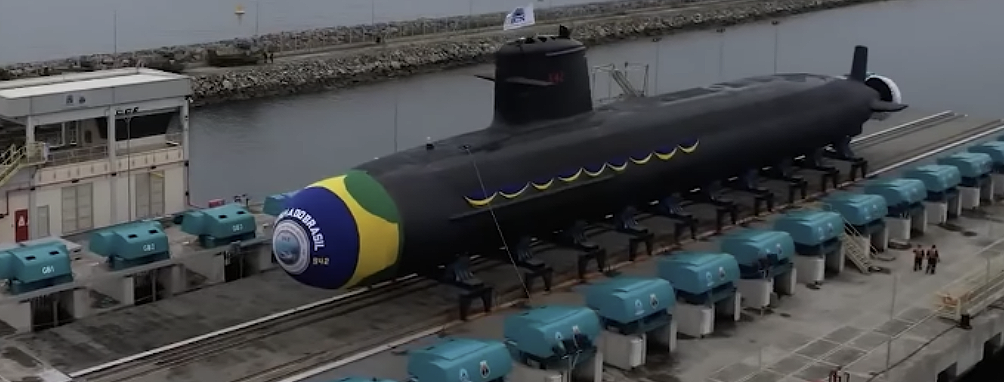How Brazil's Nuclear Submarine Program is Progressing
How Brazil's Nuclear Submarine Program is Progressing. Brazil's ambition to join the exclusive club of nations operating nuclear-powered submarines is steadily, albeit slowly, moving forward. The Program for the Development of Submarines (PROSUB), a strategic initiative of the Brazilian Navy, aims to deliver the country's first nuclear-powered attack submarine (SSN), the "Álvaro Alberto".
NEWS
Unveiled Brazil
6/10/20252 min read


How Brazil's Nuclear Submarine Program is Progressing
Brazil's ambition to join the exclusive club of nations operating nuclear-powered submarines is steadily, albeit slowly, moving forward. The Program for the Development of Submarines (PROSUB), a strategic initiative of the Brazilian Navy, aims to deliver the country's first nuclear-powered attack submarine (SSN), the "Álvaro Alberto". This monumental project represents a significant leap in Brazil's defense capabilities and technological prowess.
The Genesis of PROSUB: A Strategic Imperative
Launched in 2008, PROSUB emerged from Brazil's need to protect its vast coastline, extensive offshore oil reserves (pre-salt layer), and strategic maritime interests. The program initially involved the construction of four conventional Scorpène-class submarines (S-BR) and the design and construction of one nuclear-powered submarine. The transfer of technology agreement with France's Naval Group has been a cornerstone, providing Brazil with crucial expertise in submarine design and construction, particularly in the non-nuclear parts of the SSN.
The "Álvaro Alberto": A National Endeavor
The SSN "Álvaro Alberto" is the centerpiece of PROSUB. While France provides assistance with the submarine's platform, the nuclear propulsion system is being developed independently by Brazil. This is a critical and complex undertaking, requiring sophisticated engineering and industrial capabilities. The reactor, known as the Laboratory for Nuclear Generation (LABGEN), is being constructed at the Aramar Experimental Center in Iperó, São Paulo. This facility is vital for testing and validating the reactor's components before integration into the submarine.
Current Status and Challenges
Progress on the "Álvaro Alberto" has been consistent but marked by the inherent challenges of such a high-tech and costly endeavor. Construction of the conventional submarines has provided valuable experience and infrastructure. The first conventional submarine, the SBR "Humaitá," was launched recently, demonstrating Brazil's growing capacity.
However, the nuclear submarine faces its own set of hurdles:
Technological Complexity: Developing a compact and safe nuclear reactor for a submarine is an immense engineering challenge.
Funding: Sustained and significant investment is crucial, and economic fluctuations in Brazil can impact the program's pace.
Human Capital: Training and retaining highly specialized engineers and technicians is paramount.
Infrastructure: Building and maintaining the necessary specialized facilities for nuclear submarine construction and maintenance is a continuous effort.
Despite these challenges, Brazilian officials consistently reaffirm their commitment to the project, emphasizing its strategic importance for national sovereignty and defense. The hull of the "Álvaro Alberto" is under construction at the Itaguaí Naval Base in Rio de Janeiro, with the expectation that the nuclear reactor will be integrated in the coming years.
Strategic Importance: Beyond Defense
The SSN "Álvaro Alberto" goes beyond mere defense capabilities. It represents:
Deterrence: A nuclear-powered submarine provides a credible deterrent, enhancing Brazil's position in regional and global security.
Technological Sovereignty: The program fosters critical technological independence and innovation across various industrial sectors.
Economic Impact: It creates high-skilled jobs and stimulates the growth of a sophisticated defense industrial base.
Environmental Protection: The ability to patrol and monitor Brazil's vast exclusive economic zone, rich in biodiversity and resources, is enhanced.
The Road Ahead
While no firm in-service date has been officially confirmed, projections suggest the "Álvaro Alberto" could be operational in the early 2030s. The completion of LABGEN, the successful integration of the reactor, and extensive sea trials will be critical milestones.
Brazil's nuclear submarine program is a testament to its long-term vision and commitment to becoming a major player on the global stage. It's a complex, multi-decade undertaking that showcases the nation's resolve to achieve true strategic autonomy and advanced naval capabilities. The world watches as Brazil navigates the intricate path toward its nuclear submarine future.
